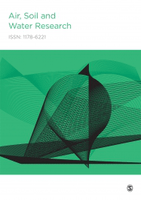
Air Soil and Water Research
Scope & Guideline
Advancing Knowledge for a Sustainable Future
Introduction
Aims and Scopes
- Environmental Pollution and Remediation:
The journal covers extensive research on various forms of environmental pollution, including air, water, and soil contamination, and explores innovative remediation techniques such as bioremediation and nanotechnology. - Water Resource Management:
A significant focus is placed on sustainable water management practices, including the assessment of water quality, irrigation efficiency, and the impact of climate change on water resources. - Soil and Agricultural Practices:
Research on soil health, erosion, and agricultural practices emphasizes sustainable farming techniques that enhance productivity while minimizing environmental impacts. - Climate Change Impacts:
The journal addresses the effects of climate change on environmental systems, including its impact on soil erosion, water availability, and air quality. - Geospatial Analysis and Modeling:
There is a strong emphasis on the use of geospatial tools and modeling techniques to assess environmental conditions, such as groundwater quality, land use changes, and pollutant dispersal. - Interdisciplinary Approaches:
The journal promotes interdisciplinary research that integrates knowledge from various fields, including ecology, engineering, and social sciences, to tackle complex environmental challenges.
Trending and Emerging
- Microplastics Research:
There is an increasing focus on microplastics and their environmental impacts, reflecting growing concerns about plastic pollution in aquatic and terrestrial ecosystems. - Climate Change Adaptation Strategies:
Research exploring adaptive strategies in agriculture, water management, and urban planning in response to climate change is on the rise, highlighting the urgency of developing resilient systems. - Integrated Water-Energy-Food Nexus:
The concept of the water-energy-food nexus is gaining traction, emphasizing the interdependencies between these resources and the need for integrated management approaches. - Use of Advanced Technologies in Environmental Research:
The application of machine learning, remote sensing, and geospatial analysis techniques is becoming increasingly prevalent, allowing for more sophisticated assessments of environmental data. - Sustainable Urban Development:
There is a growing trend in research focused on sustainable urban practices, including air quality improvement and urban water management, driven by the rapid urbanization and associated challenges.
Declining or Waning
- Traditional Agricultural Practices:
Research centered around traditional farming practices has decreased as there is a growing emphasis on innovative and sustainable agricultural methods that adapt to climate change and improve soil health. - Static Pollution Studies:
Studies that focus solely on static pollution assessments without considering dynamic interactions between air, soil, and water systems have become less prominent, as there is increased recognition of the need for holistic approaches. - Heavy Metal Contamination:
While still important, the frequency of studies specifically targeting heavy metal contamination has waned, possibly due to a shift towards broader environmental health assessments that include multiple pollutants. - Water Quality Monitoring Without Contextual Analysis:
Research that focuses solely on water quality measurements without integrating socio-economic or environmental context has seen a decline, reflecting a trend towards more integrated studies.
Similar Journals
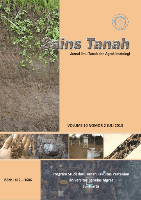
SAINS TANAH
Exploring Soil Science for Global ImpactSAINS TANAH is a renowned peer-reviewed journal that focuses on the fields of agronomy, soil science, and environmental studies, published by Universitas Sebelas Maret Surakarta in Indonesia. Established as an Open Access platform since 2001, it aims to disseminate high-quality research that addresses critical issues in soil health, crop management, and pollution, thereby fostering sustainable agricultural practices. With its current impact factor demonstrating a Category Quartile ranking of Q3 and Q4 in major areas such as Agronomy and Crop Science, Atmospheric Science, and Pollution, SAINS TANAH serves as an essential resource for researchers, professionals, and students dedicated to advancing knowledge and solutions in these vital fields. By providing a collaborative environment and upholding rigorous academic standards, the journal not only highlights the significance of Indonesian research contributions but also aims to connect local insights with global agricultural and environmental challenges.

EURASIAN SOIL SCIENCE
Innovating solutions for soil conservation and management.EURASIAN SOIL SCIENCE, published by PLEIADES PUBLISHING INC, is a premier journal dedicated to advancing knowledge in the fields of soil science and earth-surface processes. With an ISSN of 1064-2293 and an E-ISSN of 1556-195X, this journal has been a key resource for researchers and professionals from its inception in 1992 and continues to thrive as it converges toward 2024. Situated in the United States, EURASIAN SOIL SCIENCE has achieved notable recognition, attaining a Q2 ranking in both Earth-Surface Processes and Soil Science categories as of 2023. Its Scopus rankings further underscore its importance, with Earth and Planetary Sciences placing it at #81/179 and Agricultural and Biological Sciences ranking it at #80/159. Engaging a global audience, this journal publishes cutting-edge research articles, reviews, and case studies that address critical issues related to soil health, conservation, and management. Though currently not open access, the journal offers valuable insights and fosters collaboration among scientists and practitioners, underscoring its vital role in enhancing the understanding of soil dynamics and sustainability.

Hydrology
Exploring the depths of hydrological knowledge.Hydrology, published by MDPI, is a prominent open-access journal dedicated to advancing the field of hydrological science. Since its establishment in 2014, the journal has garnered a reputation for excellence, reflected in its classification within the Q2 quartile for 2023 across multiple categories including Earth-Surface Processes, Oceanography, Water Science and Technology, and Waste Management and Disposal. Based in Switzerland, Hydrology provides a vital platform for scholars and practitioners to disseminate research findings, promote innovative methodologies, and foster discussions on current trends affecting water resources and management globally. The journal is easily accessible online and aims to significantly contribute to the understanding of hydrological processes, offering insights that are pivotal for addressing contemporary environmental challenges. With Scopus rankings showcasing its growing influence, Hydrology is a crucial resource for researchers, students, and professionals committed to water science and sustainable practices.
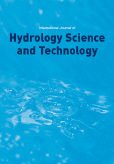
International Journal of Hydrology Science and Technology
Bridging Theory and Practice in Environmental EngineeringThe International Journal of Hydrology Science and Technology, published by InderScience Enterprises Ltd, is a distinguished platform dedicated to advancing knowledge in the field of hydrology, environmental engineering, and water science. With an ISSN of 2042-7808 and an E-ISSN of 2042-7816, this journal, established in 2011 and continuing through 2024, serves as an essential resource for researchers, professionals, and students alike. Despite being categorized in the Q3 quartile across multiple disciplines including Earth and Planetary Sciences, Environmental Engineering, Waste Management and Disposal, and Water Science and Technology, the journal maintains a reputation for contributing significant findings that impact both theory and practical applications in addressing hydrological challenges. Currently unavailable through Open Access options, the journal remains committed to disseminating valuable research that informs sustainable practices in water resource management. The editorial team encourages submissions that explore innovative strategies and methodologies while fostering interdisciplinary discussions, making this journal a pivotal player in shaping the future of hydrological science.

Journal of Water Management Modeling
Transforming Water Resources Through Collaborative ResearchThe Journal of Water Management Modeling, published by COMPUTATIONAL HYDRAULICS INT, stands as a pivotal resource in the fields of Civil and Structural Engineering, Geography, Planning and Development, and Water Science and Technology. With an ISSN of 2292-6062, this Canadian-based journal has earned its reputation by exploring innovative modeling approaches to enhance water management, crucial in addressing today's environmental challenges. Despite its current Q3 status in Civil and Structural Engineering and Water Science categories, alongside a respectable Q2 rank in Geography, the journal is committed to advancing knowledge and fostering collaboration among researchers, practitioners, and students passionate about the sustainable management of water resources. The journal operates on an open-access model, ensuring research is readily available to a broad audience, and has converged its editorial focus from 2018 to 2024, continuously adapting to emerging trends and technologies within the discipline. As a part of the global conversation regarding effective water management, it plays a vital role in informing policies and practices that impact communities and ecosystems alike.

Asian Journal of Water Environment and Pollution
Fostering impactful discussions on water pollution management.Asian Journal of Water Environment and Pollution is a leading academic journal published by IOS PRESS, dedicated to advancing the field of water science and technology, as well as pollution management. With its ISSN 0972-9860 and E-ISSN 1875-8568, this journal serves as a pivotal platform for researchers, professionals, and academics alike who are keen to explore innovative solutions and interdisciplinary approaches toward water-related challenges and environmental issues. Although currently positioned in the Q4 category for both pollution and water science & technology, the journal aims to foster impactful research and discussions that can enhance the understanding and treatment of water pollution. The Asian Journal of Water Environment and Pollution not only plays a crucial role in disseminating knowledge but also encourages the sharing of findings from unique geographic perspectives, particularly from Asia. As the field evolves, this journal is poised to become a vital resource for those looking to contribute to sustainable water management practices and pollution reduction strategies.

Water Conservation Science and Engineering
Empowering Global Efforts in Water ConservationWater Conservation Science and Engineering, published by SPRINGERNATURE, is a vital academic journal dedicated to advancing the fields of environmental engineering, ocean engineering, waste management, and water science and technology. Since its inception in 2016, the journal has quickly established itself within the academic community, achieving a commendable Q3 ranking across multiple categories in 2023. With an ISSN of 2366-3340 and an E-ISSN of 2364-5687, it is accessible to a global readership eager to explore the latest research and innovations in water conservation and sustainable practices. Although currently not open access, the journal is committed to publishing high-quality scholarly articles that provide insights into effective water management strategies, innovative engineering solutions, and the critical importance of preserving our water resources. Based in Singapore, Water Conservation Science and Engineering aims to foster interdisciplinary collaboration among researchers, professionals, and students, making it an essential resource for anyone passionate about environmental sustainability and preservation.

Terra Latinoamericana
Championing Open Access for Groundbreaking DiscoveriesTerra Latinoamericana is a prominent academic journal published by the Mexican Society of Soil Science, focusing on the essential disciplines of soil science, biochemistry, and ecology. With a dedicated commitment to open access since 2014, this journal provides a platform for researchers and professionals to disseminate and access cutting-edge research aimed at understanding soil interactions, environmental pollution, and ecosystems within Latin America. The journal holds a Q4 ranking in multiple categories, including Ecology and Soil Science, reflecting its growing presence in the academic landscape and its role in fostering scholarly communication within these fields. Though currently positioned in the lower quartiles, Terra Latinoamericana presents a valuable opportunity for emerging scholars and experienced researchers alike to contribute impactful findings and engage with key issues affecting soil health and ecological sustainability in diverse environments. By promoting innovative research and collaborative dialogue, this journal continues to shape the future of soil science and related disciplines, making it an indispensable resource for the scientific community.
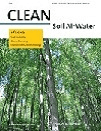
CLEAN-Soil Air Water
Pioneering Discoveries in Pollution and Water ScienceCLEAN-Soil Air Water, an esteemed journal published by Wiley, serves as a vital platform for disseminating research in the fields of environmental chemistry, pollution, and water science and technology. Operating under an Open Access model, it embraces the principles of knowledge sharing, making significant research findings readily accessible to a global audience. With an ISSN of 1863-0650 and an E-ISSN of 1863-0669, the journal has demonstrated its importance in the academic community, reflected in its Scopus rankings within the top quartiles of its categories. Established in 2007 and continuing through to 2024, CLEAN-Soil Air Water offers researchers, professionals, and students an opportunity to explore innovative studies that address pressing environmental challenges, facilitating an exchange of novel ideas and techniques essential for sustainable development. With a publication footprint in Germany and a growing international reputation, this journal is an invaluable resource for those dedicated to advancing the science and practices of environmental stewardship.
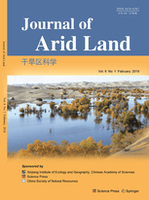
Journal of Arid Land
Transforming research into policy for arid regions.Journal of Arid Land, published by SPRINGER HEIDELBERG, is a pivotal platform dedicated to advancing knowledge in the fields of Earth-Surface Processes, Management, Monitoring, Policy and Law, and Water Science and Technology. With an ISSN of 1674-6767 and an E-ISSN of 2194-7783, this journal stands out as a prominent source of scholarly research focusing on the unique challenges and opportunities of arid and semi-arid environments, particularly relevant in the context of global climate change. As of 2023, it holds a commendable Q2 ranking in several critical categories, underscoring its impact in environmental science and related disciplines. The journal, which has been in publication since 2009 and is set to continue through 2024, provides unrestricted access to high-quality research that sheds light on sustainable practices and effective policies. With its focus on arid lands, the Journal of Arid Land plays an essential role in fostering interdisciplinary dialogue among researchers, practitioners, and policymakers striving to address the pressing issues faced by these ecosystems.